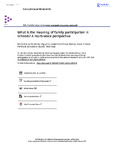What is the meaning of family participation in schools? A multi-voice perspective

Not available until 9999-99-99
Use this link to cite
http://hdl.handle.net/2183/40742Collections
- Investigación (FEDU) [938]
Metadata
Show full item recordTitle
What is the meaning of family participation in schools? A multi-voice perspectiveDate
2024-07-31Citation
Martínez-Figueira, M. E., Fernández-Menor, I., Crestar Fariña, I., & Mulloni Martínez, S. (2024). What is the meaning of family participation in schools? A multi-voice perspective. Educational Research, 66(4), 381–395. https://doi.org/10.1080/00131881.2024.2385414
Abstract
[Abstract] Background: Many studies show a positive link between student achievement and family participation in school. Family participation in school can also benefit the whole educational community, contributing to a shared community responsibility for education. Despite this, in many schools, family participation can be incidental or superficial. There are also different understandings of the role of families in schools, with the term ‘family participation’ being ambiguous and complex. Purpose: This study aims to analyse how family participation in school is understood in one region of Spain. It explores different forms of family participation by giving voice to a range of different groups involved in students’ education – not just families and teachers. The questions guiding the study are as follows: 1) What role does communication play in family participation in schools?; 2) What are the actions taken by different stakeholders when participating?; 3) How do families approach their rights and duties when participating in school?; 4) What are the barriers to family participation?; and 5) what are the actions for improvement that favour a participatory culture? Method: A qualitative, participatory methodology was used, drawing on data collected through semi-structured interviews, both group and individual, with 44 multi-stakeholder participants. A thematic content analysis was carried out using Maxqda22, a qualitative data-analysis programme. A deductive system that generated categories was combined with an inductive system that generated codes. Findings: The key factor to achieving participation was effective communication. Sometimes, this was initiated by the school towards the family, and at other times, at the request of the family. In either case, the key to success lay in the design of communicative strategies that went beyond the transmission of information about urgent events occurring at school. Suggested solutions for improving family–school interaction included trusting in families, and training them, or providing them with the necessary tools to approach their participation. Conclusions:
Participation varies in its nature and occurs when there is a shared school-family project in which attitude and communication play an important role. Barriers to participation include ideological differences, and a lack of genuine awareness of the importance of the role that families can play in school. The main proposal to promote family participation is to find ways to overcome individualism through shared projects.
Keywords
Participation
Parent involvement
Parent engagement
Home-school relationships
Collaborative network
Parent involvement
Parent engagement
Home-school relationships
Collaborative network
Editor version
Rights
© 2024 NFER
ISSN
1469-5847





